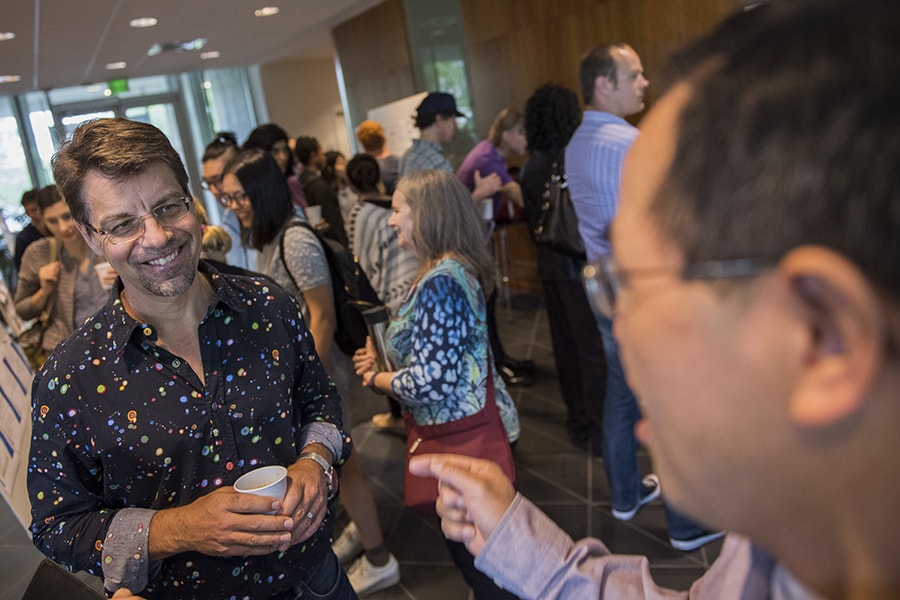New Research Projects Will Close Opportunity Gap for Students Chan Zuckerberg Initiative and Bill & Melinda Gates Foundation Sponsor Carnegie Mellon Research
Byron SpiceFriday, April 12, 2019Print this page.

The Bill and Melinda Gates Foundation and Chan Zuckerberg Institute are sponsoring a pair of separate but complementary research projects led by the Human-Computer Interaction Institute that combine human support and artificial intelligence-based tutors to improve math achievement, especially in schools serving black, Latinx, and underresourced students.
The Chan Zuckerberg Initiative (CZI), founded by pediatrician Priscilla Chan and her husband, Facebook CEO Mark Zuckerberg, has awarded $1.5 million for one study. The Gates Foundation, established by Microsoft founder Bill Gates and his wife, Melinda, is providing $1.9 million for the other.
Lagging math achievement, the result of fewer quality learning opportunities for marginalized students, has been a persistent problem in underserved schools. This "opportunity gap" is critical because math increasingly is a gateway to high-paying 21st century careers, said Ken Koedinger, a professor of human-computer interaction and psychology at CMU and the principal investigator for both studies.
The researchers, in partnership with the University of Pittsburgh's Center for Urban Education and educators in local school districts, hope to close the gap by building the capacity of teachers, parents and mentors to focus on motivation and emotional well-being of students, while leveraging the adaptive problem sequencing capabilities of AI-based tutors developed at CMU.
"Engaging young people in successful, high-quality learning opportunities requires caring parents, mentors, teachers and peers. Cognitive tutors have been shown to also improve math achievement," Koedinger said. "In these projects, we combine the best characteristics of humans and technology to provide these caregivers with deeper insight into what leads students toward enhanced persistence and motivation, despite the obstacles they face."
Psychological and Motivational Factors in Middle School Math
Vincent Aleven, professor in the Human-Computer Interaction Institute, is co-principal investigator for the Gates Foundation study, in which the researchers will work with Judith Harackiewicz, a professor of psychology at the University of Wisconsin-Madison. Partnering with schools in the Greater Pittsburgh area affiliated with CMU's LearnLab, they will investigate whether combining proven motivation and learning activities yields much more than either alone. These activities include those known to increase student motivation by helping students discover the future value of what they are learning in coursework.
"We think we can get multiplier effects by addressing motivational and cognitive issues together," Koedinger explained.
One innovation will be an app developed by CMU that will be akin to a "FitBit for learning," able to provide fast feedback to mentors and students on whether students are making good progress and, if not, whether and what kind of motivational support or content support is needed. New data analytic algorithms will make these distinctions possible and the app will provide on-the-job recommendations for teachers, mentors and tutors on best practices, informed by research on learning, motivation and urban education. By using the new app, these caregivers can work more efficiently by focusing their interventions where they are most needed and setting meaningful learning and practice goals for students.
AI and Mentoring to Bridge Opportunity Gaps in Urban School
In the CZI project, CMU researchers will partner with Pitt's Center for Urban Education (CUE) to develop effective intervention with mentors serving as tutors. With particular attention on underserved students, these projects will provide support for math students in local schools, including the Pittsburgh Public, Propel, Shaler and Elizabeth Forward school districts. Pilot studies will begin this spring, with the projects more fully implemented when the new school year begins in the fall.
For the last year and a half, CUE has operated a program called the Heinz Fellows in several Hill District schools. The fellows come from a variety of backgrounds — former teachers, new college grads, people making a career pivot — and serve as mentors in the schools. For the CZI project, a new afterschool program providing supplemental support in math is planned for the University Preparatory at Margaret Milliones secondary magnet school.
"We believe that a positive relationship between a mentor and a mentee will help support students to be more engaged and more motivated to do math," said Kenny Donaldson, CUE associate director of strategic programming and initiatives. The Heinz Fellows have the advantage of having already established those relationships. Plans are to expand to two more Pittsburgh Public Schools in the fall.
Somewhat different approaches will be employed in the other schools. In the Propel Schools, paraprofessionals will provide social-motivational support for students, while Shaler will focus on parental engagement and Elizabeth Forward will concentrate on teacher improvement.
All of the school districts participate with CMU's LearnLab, which is directed by Koedinger. As part of CMU's Simon Initiative — a cross-disciplinary, learning-engineering project that aims to improve student outcomes — LearnLab works to enhance scientific understanding of learning and to support field-based research and development. AI-based cognitive tutors, pioneered at CMU, have been one of LearnLab's primary tools, enabling both personalized learning for students and the collection of information on how students learn.
"This CMU project has the potential to increase the confidence level of our students as they see their math skills improving. When students feel a sense of self-confidence, they're more likely to achieve at higher levels," said Tina Chekan, CEO and superintendent of Propel Schools. "This is also an investment in improving the quality of education that we provide, and that's something we're always interested in doing."
Byron Spice | 412-268-9068 | bspice@cs.cmu.edu
